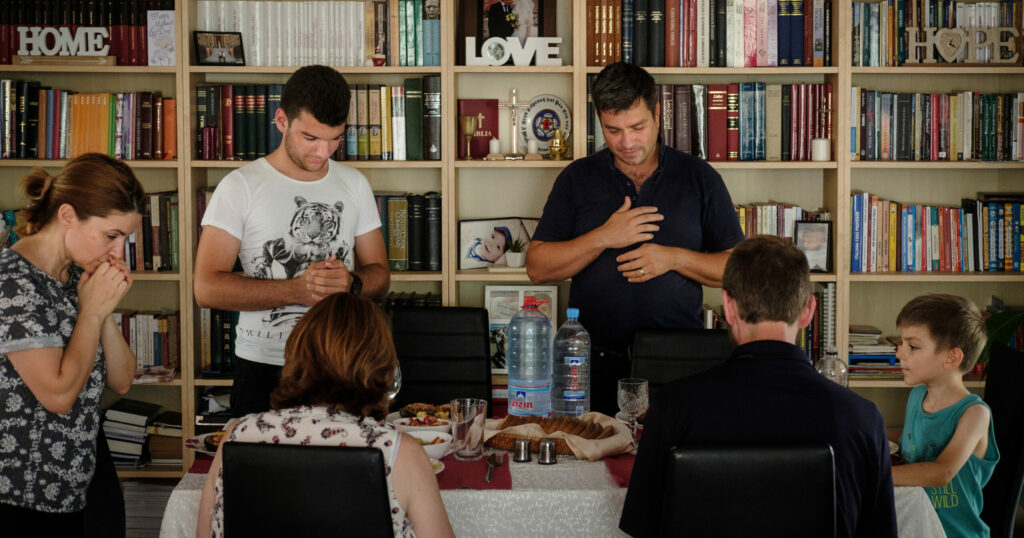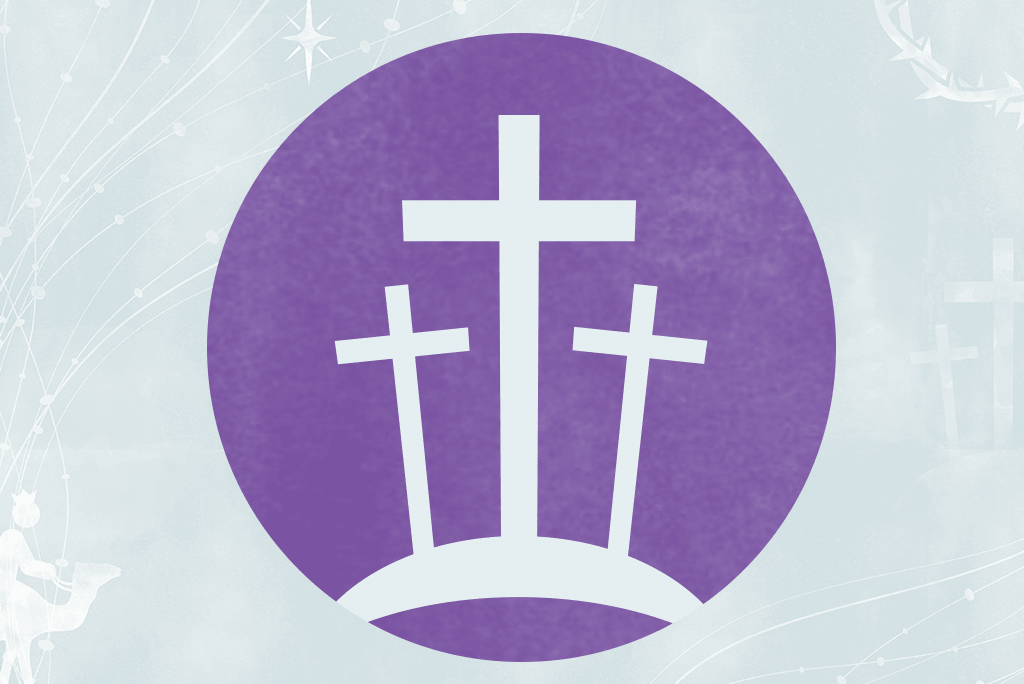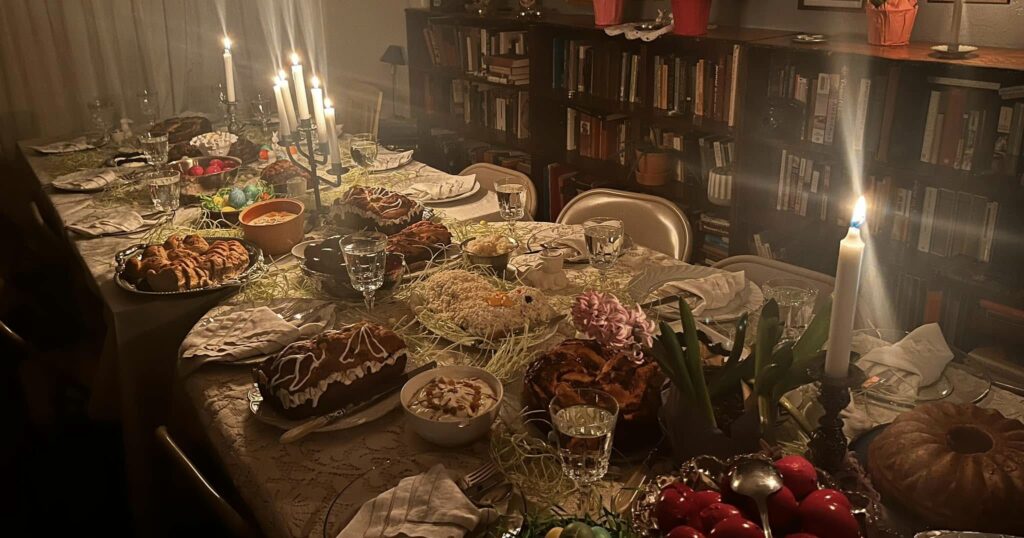By Liv Booth
Mount Laundry has grown into the Great Western Laundry Range, and even if I level it today, it will grow back almost instantly. I try to get on top of the repetitive stuff, but it seems like I’m going round in circles and getting nowhere. As I get older, the circles feel faster. Another Christmas comes around, and I think, “Didn’t we just do this?” Yes, we did. We live in cycles. And as Christians, we can confess through our homes that God is for us right here in the cycles of life.
The core of our Lutheran faith is the love of God for us, given through incarnate means — physical things. At the rail, you hear “given and shed for you, for the forgiveness of your sins” as you open your mouth like a baby bird to receive Him. At the font, you were “sealed on the forehead and on the heart as one redeemed by Christ the crucified.” As you make the sign of the cross, remembering your Baptism, you remember also the Lord’s life-giving embrace which enfolds you — the real you, who is tired of going round and round, completing tasks that only have to be done again.
But like a morning glory vine whipping up a pole to flower in the sun, my circles make a spiral, a pattern made by the Lord to bring me closer to Him, daily closer to my real home. Jesus lived in our life cycles with us. He woke and slept, got dirty and washed, made and spent His money. He who set the solar system in motion designed us to live in cycles, and He lives them alongside us now, leading us up and up, round and round, to flower in the sun.
The Lord has been inviting us to loop through the year with Him since He gave Moses a pattern of fasts and feasts for the people of Israel. He invites us to see our mundane cycles as part of His bigger story of creation, redemption and resurrection. As the Israelites walked through the yearly rotation of fasts and feasts, they felt the cycle of suffering, promise, preparation, longing, fulfillment and rejoicing. This religious cycle repeated the story of God’s kindness — and in turn, sanctified their earthly orbits. Their repeated everyday tasks became confessions of God’s love as they kept the fasts and feasts.
Likewise, our homes can confess that God is for us when we root them in the Church Year. The church’s seasons provide us with countless practical, physical elements to confess that life, hope and a future are for us. Lived inside the great cycle of the Church Year, even the rise and fall of Mount Laundry can become liturgical.
How? The Church Year and the daily practices of the faith help us notice Christ’s presence in our daily lives, encouraging us to engage all our senses, reminding us that this spiral ride is carrying us up toward our final home.
A good place to start is the act of brief, repeatable prayer, acknowledging the Lord’s loving presence marked by physical daily events, confessed in physical (aloud is helpful) words. You may feel all kinds of uncomfortable at first! I fall prey to the lie that these practices are only for Super Christians, not me. Ask the Holy Spirit to fight this lie for you. There are no “Super Christians.” “It’s too late; I should already have done these practices. I won’t do them consistently. There will be times I just don’t want to.” Realize that faltering in our prayers is itself part of the cycle — it’s even mentioned in our rite of private confession. The Lord knows we won’t keep any practice faithfully. But He is faithful, and that’s the point. It’s never ever too late to watch Him being faithful as He guides our vines growing up and up, around and around.
Pick up your Lutheran Service Book, or download the InPrayer app from CPH. Or start with something even simpler! We all wake up — say a “Glory Be,”1 no more. We all eat lunch — say an “Our Father.” We all go to bed — say Luther’s Evening Prayer. Each of these pauses, tied to a physical event, can confess that God is for me. The Order of Morning Prayer reminds me that every day is a new day, in Christ. Morning and evening happen anyway; why not confess that the Lord is for us by beginning and ending our day with the sound of Matins and Compline? Sitting down is an act of faith, confessing with my body that the Lord is, in this moment, for me.
Next, join Christ in the dance of the Church Year. Check the front of your hymnal or the amazing resource Treasury of Daily Prayer. There’s something for every day of the year: a church season, a feast or remembrance day, a Scripture reading, a whole section of hymns that align with the cycle.
Each church season comes with a color. Try putting that color on your table, or in your window, or as your phone wallpaper. In my kitchen, I have a corner shelf with a crucifix, a candle, the names and baptismal birthdays of my godchildren, some pictures of people I love, and something in the color of the season. My shelf continually confesses that God is for me, while I take out the trash — again.
The purple of Lent will remind you to slow down and think of Jesus preparing for His great sacrifice for you. The green through summer and fall will remind you that the Holy Spirit is growing you at His own pace just as He grows His church. Watch your home parallel the church cycles, and you might more often notice that Christ is in your home just as He is in the church. The feasts might mean more to you when you embrace the anticipation. Try keeping your palm frond from Palm Sunday until next Ash Wednesday, and then burn it. The Advent wreath (invented by Lutherans, to keep the record straight) is a great way to mark the Old Testament prophecies of the Messiah about to be fulfilled — for you!
Immanuel is for us in our cycles — laundry, dishes, morning, Advent, sin, evening, Easter, repentance. Up and up we go, round and round with Jesus who is for us. The very repetition that drives me crazy can confess that God is for me, and for you.
1 “Glory be to the Father and to the Son and to the Holy Spirit; as it was in the beginning, is now, and will be forever. Amen.”

This article originally appeared in the October 2024 issue of The Lutheran Witness.






Thank you for stressing “God is for you” throughout the entire article. If that is not a personal relationship with our Redeemer then I don’t know what is. You focused on His salvific love throughout each day of our lives bringing the greatest comfort to saint/sinners. Thanks be to God!
“One person esteems one day as better than another, while another esteems all days alike. Each one should be fully convinced in his own mind” (Romans 14:5 ESV).
Excellent perspective on God’s ordering of all cycles large and small! Our God is “the” God of order and when we realize this… we see it is for His glory that all things work together for the good of those who love and trust in Him. Blessings…
I suppose that the rituals and prompts, and calendar events used by the church to keep the flock focused on a faithful and enduring life in Christ will always have a place. It is good to incorporate them into the home lives of Christians, because their repetition forms bonds and traditions for the family of God. But it is important that the ritual not become the main event. The Christian life is first and foremost an undistracted personal relationship and close knit reverence for the person of Christ, as exclusively described in the Apostles Creed. A daily desire to know God more intimately, praying frequently, growing in grace….this is the one needful thing. Soli Deo Gloria
John, I think you are missing the point. There are no “relationships” without ritual.
Take for example my relationship with my wife. I get up, I make her coffee, I kiss her goodbye on my way to work, I hug her when I return home, we gather round the table and eat dinner with the kids, we go to bed. This IS the substance of my “undistracted personal relationship” with her. These small daily rituals that I engage whether I feel like doing them or not are what foster and grow intimacy, affection, trust.
Just so with God. As Jesus himself showed us by “regularly” seeking out time and places to be alone with God and by keeping the feasts.
The tried and true rituals that Christians have used throughout history (the liturgy, the church year, the spiritual disciplines) are certainly not “required,” (just like kissing my wife and telling her I love her in the morning is not required required) but time has proven them to be salutary.